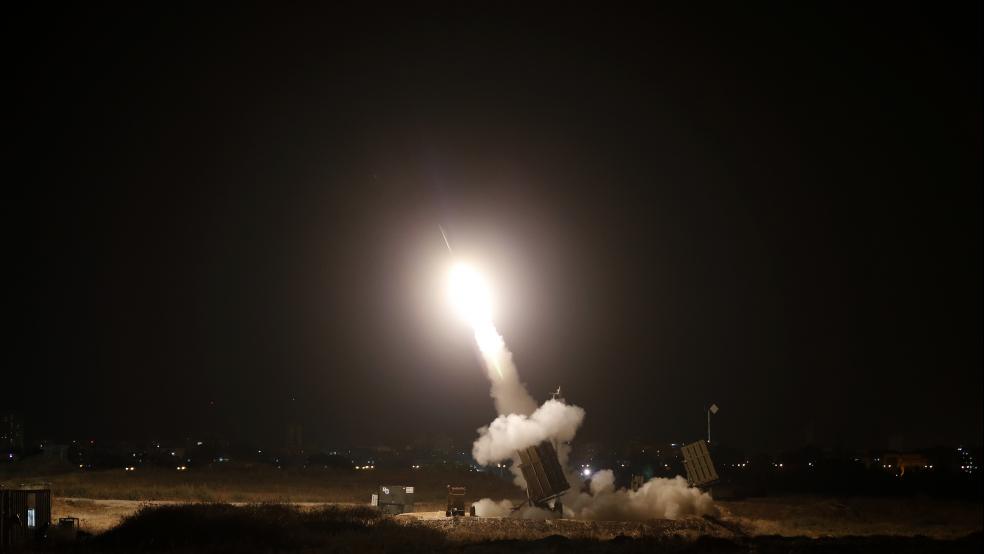In an unusual bit of drama on the Sunday talk shows, an interview with Israeli Prime Minister Benjamin Netanyahu was punctuated by air raid warnings, as the conflict between his country’s military and members of the militant group Hamas in the Gaza Strip continued to blaze.
As Netanyahu prepared to speak via satellite with CBS News anchor Bob Schieffer on Face the Nation, Schieffer reported that warning sirens had just gone off in Tel Aviv, alerting residents that rockets targeting the city had been fired from Gaza, where members of the militant anti-Israel group Hamas have a stronghold.
Related: U.S. Again Misreads Players in Mideast Crisis
After Netanyahu had been speaking to Schieffer for a few minutes, he was interrupted by another alert, audible to the television audience.
“When we began this interview we were under bomb alert,” Netanyahu explained as he listened to the announcement. “As the minutes passed, now we are being told people can go out into the open area. This is the kind of reality we’re living in…and we’ll do whatever is necessary to put an end to it.
Netanyahu’s interview with Schieffer took place hours after Israeli commandos raided several sites in Gaza, engaging in a firefight with Hamas members and destroying some of the launchers that have been used to fire hundreds of rockets into Israel over the past few days.
The overnight raid was the first ground incursion by Israel into the Gaza Strip during this most recent conflict, but it was not Israel’s only defensive action. Over the past several days, the Israeli military has conducted some 1,300 airstrikes in the densely populated Palestinian area, killing more than 170 people and wounding well over one thousand, the majority civilians.
Related: Thousands of Gaza Civilians Flee After Israeli Warning
There were several telling points about Schieffer’s exchange with the Israeli Prime Minister. First, it is undeniable that for the Israeli public, living under the constant threat of rocket attacks falls somewhere on the scale between unnerving and terrifying. But the fact that Tel Aviv evidently went from high alert to all clear in a matter of minutes is also significant – and it suggests that there may be no quick solution to the current conflict.
Israel is protected by a missile defense system known as the “Iron Dome.” Using technology largely supplied by the United States, the Israeli military can track rockets from almost the moment they leave Gaza, and by analyzing their trajectory, identify those that are a threat to the civilian population. Any rockets headed toward vulnerable areas are promptly shot down before they can do any damage.
To date, no Israelis have been killed by the Hamas rocket fire, and only a handful have been injured. In an appearance earlier Sunday morning on Fox News Sunday, Netanyahu praised the Iron Dome system and said, “I want to thank the U.S. people, President Obama and the Congress” for helping finance it.
But while the missile defense system is undoubtedly saving Israeli lives, in an ironic twist, some analysts believe that it is likely to prolong the conflict with Hamas by reducing pressure on Netanyahu to negotiate a cease-fire.
Related: Is Obama’s America Becoming More European
Because it is so densely populated and so close to Israel, the only way for Israel to guarantee an end to the rocket attacks is to either mount a full-scale invasion of Gaza, or to negotiate an agreement with Hamas.
Israel has called up tens of thousands of army reservists and has sent tanks to the border, but few believe an invasion is in the offing. Appearing on NBC’s Meet the Press Martin Indyk, until recently the U.S. Special Envoy for Israeli–Palestinian Negotiations, said bluntly, “The bluff of massing tanks on the border is not working.”
That leaves negotiation, and on the Israeli side, the lack of casualties due to the effectiveness of the Iron Dome has blunted pressure for Netanyahu to aggressively seek a negotiated settlement, leaving the military free to continue attacking Hamas in Gaza.
As for Hamas, the group has historically not let civilian casualties from Israeli counterstrikes stand in the way of its attacks. In fact, it has frequently used such collateral damage to help it raise funds from anti-Israel governments and individuals across the Middle East.
Related: Sectarian Genie Is Out of the Bottle from Syria to Iraq
Making matters worse, Egypt, possibly the only country that has enough credibility with both the Israelis and Hamas to serve as a broker in any negotiation, has so far shown little appetite for getting involved in the situation.
The facts on the ground in Israel, experts say, suggest a conflict with no end in sight.
Appearing on CNN’s State of the Union, veteran Middle East peace negotiator Aaron David Miller, an adviser to six U.S. Secretaries of State, was unequivocally pessimistic.
“Effective mediation requires urgency, a mediator, and a deal,” he said. “And frankly right now, you don’t have any of those things. Hamas and Israel are simply not done, there is no deal on the table, and the Egyptians seem reluctant.”
He concluded by adding, “The tragedy of this entire enterprise is likely to play out for a good while longer.”
Top Reads from The Fiscal Times
- White House Touts Continued Decline in the Deficit
- Congress Uses Accounting Gimmicks to Fund Highway Bill
- The New Space Race, and Why Nothing Else Matters





